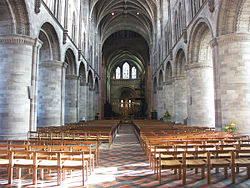Robert de Bethune
| Robert de Bethune | |
|---|---|
| Bishop of Hereford | |

Interior view of Hereford Cathedral, where Robert de Bethune is buried.
|
|
| Appointed | 1130 |
| Term ended | 16 April 1148 |
| Predecessor | Richard de Capella |
| Successor | Gilbert Foliot |
| Other posts | Prior of Llanthony |
| Orders | |
| Consecration | 28 June 1131 |
| Personal details | |
| Died | 16 April 1148 Rheims |
| Buried | Hereford Cathedral |
Robert de Bethune (died 1148) was a medieval Bishop of Hereford. From a knightly family, he became a teacher before becoming a canon, a type of monk, by 1115. He was elected prior of Llanthony Priory in the middle 1120s, and was named bishop by King Henry I of England in 1130. As bishop, he was often appointed a judge by the papacy, and was known for the care he took of his diocese.
After Henry's death in 1135, Bethune first supported King Stephen, who seized the throne from Henry's heiress the Empress Matilda, but when Matilda's forces captured Stephen, Bethune switched sides to support Matilda. When Matilda did not secure the throne, Bethune once more switched back to supporting Stephen. Construction of Hereford Cathedral was completed under Bethune's episcopate, and consecrated in 1142 and 1148. Stephen appointed Bethune as one of the English bishops that the king allowed to attend the Council of Rheims in 1148, and Bethune died there in April 1148. A hagiography is the only surviving evidence of Bethune's cathedral chapter's attempts to promote him as a saint.
Born around 1080, Bethune was the youngest son of a knightly family from within or close to the town of Béthune in Artois. His friend and biographer William of Wycombe said he and Robert came from nearby villages, which suggests that Robert grew up in Buckinghamshire, maybe at Wingrave where in 1086 the major landowner was the knight Gunfrid of Chocques, whose family came from the village of that name outside Béthune. Robert's eldest brother, also called Gunfrid, was a schoolmaster and trained his young brother in the same profession. However he died, and Robert had to make provision for his children. This done, he went to study theology under William of Champeaux and Anselm of Laon. He was a canon of Llanthony Priory before 1115, and was elected prior of that house in the middle 1120s. Before becoming prior, he was entrusted with establishing a cell of the priory at Weobley, which had been established by Hugh de Lacy shortly before Lacy's death around 1115.
...
Wikipedia
